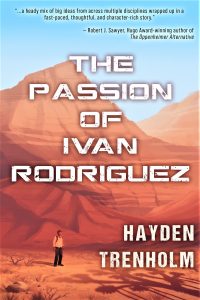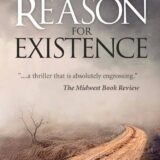
OBIR: Occasional Biased and Ignorant Reviews reflecting this reader’s opinion.

The Passion of Ivan Rodriguez – by Hayden Trenholm
Publisher: Tyche Books, Calgary, Alberta, Canada, 2023
Cover Art – by Kayla Kowalyk
Premise:
The end of the world has finally come. What are you going to do about it?
Review:
Make no mistake, this is a great book, a fun, page-turning, thought-provoking read. I state this at the beginning of my review because my first comments might lead you to believe otherwise, but that would be a false impression. My initial remarks are merely to set the context.
End of the world works are not uncommon these days, if only because, in a non-religious sense, scientific evidence increasingly suggests we live in “end times.” Furthermore, it is evident, at least to me, that while the human race is a swell bunch of people as individuals, collectively we appear to be too greedy and too stupid to save ourselves from ourselves. This being the case (debateable, I know), and the best science fiction being extrapolations of what’s happening now, post-apocalyptic dystopic novels are a growing trend. Something of a band wagon to jump on.
Heck. Even I have written an “end of the world” novel. First draft completed last summer. I’ve been trying to find the time—and the courage—to revise it into a workable second draft suitable for showing people. Not there yet. I only mention it to imply a lot of people are working in this sub-genre nowadays.
The modern novel of this type invariably shares certain background tropes in common. This is true of TPOIR and my manuscript, for example. But no plagiarism or stealing ideas is involved. We’re both just riffing off this particular sub-genre’s background setup. The way a Western might include horses, cowboys, a wagon train, six-guns and so on. Nobody out there is eagerly awaiting lengthy info-dumps describing the familiar. What readers want are quirky, original interpretations of background, setting, and characters that make the work fresh and exciting to read. Or so I like to believe. Mind you, catering to cliches is a useful market in itself, but generally not what makes a novel great.
TPOIR is a great novel. The cliches or tropes it makes use of are mere foundation stones. After all, you can’t write about what’s going to happen unless you include a comprehensive list of what many people think is likely to happen, given current trends.
Here is a list of tropes TPOIR and my novel have in common, as do many other works already published or in the course of being written:
Takes place several hundred years in the future/polar icecaps and glaciers no longer exist/dramatic rise in sea level/several limited nuclear wars have occurred/multiple plagues both natural and lab-bred/global warming renders some areas uninhabitable/90% of human race extinct/most animal species reduced in population/much land area too poisonous or desolate for plant life to recover/most cities abandoned and in ruins/economic and transportation infrastructure utterly destroyed/satellites and associated technology basically just folklore/nations no longer exist/people struggling to survive/can’t trust anybody.
I know what you’re thinking. Any writer worth his salt can have a lot of fun with this sort of background. Means the readers will too.
As a teenager, I loved the “Mighty Samson” comic book series. The protagonist, a muscular fellow whose favourite weapon was a hefty club, lived among the jungle-covered ruins of N’Yark City, his principal task defending the locals from assorted mutant monsters and/or evil raiders from across the Hudson River. He also liked to help Mindor, a literate science-minded tinkerer who kept poking about the ruins in search of intact relics from “the ancient days of mankind’s glory.” I found Mindor’s attempts to revive lost science even more fascinating than battling mutants. Every issue an archaeological treasure hunt as it were. So, naturally I was keen to see how Hayden handled surviving remnants, if any, of pre-collapse civilization.
Though most of the action takes place in Canada and the northern United States, these nations no longer exist, not even as a concept. The continent is a patchwork quilt of isolated communities separated by wasteland inhabited by bandits preying on any and all efforts at trade. Literacy is practically unknown, though a bardic tradition of sorts exists here and there. Politically, every community has evolved on its own, based in part on half-remembered traditions, but mostly on the limits of local resources and human shenanigans common in all eras. Social structures vary from subsistence-level hunter-gatherers to complex societies obsessed with order and discipline as the only means to survival. Plenty of decent people everywhere, but often overruled and even enslaved by demagogues whose followers cling to them for all the usual reasons, not least the promise of a return to “the good old days.”
A few vehicles exist here and there, dependent on dwindling stocks of fuel, but mostly horse-drawn wagons provide transport. No railway lines functioning. No aircraft. No ships at sea.
The book is a primer on possible reactions to the collapse of civilization by generations of remaining survivors, and what technology still exists is limited in the extreme.
Take Ivan Rodriguez. He’s barely literate but has a “natural” ability to perceive patterns in radical ways. Something of an urban myth, a lot of people want to find him. including the minions of the Dictator of Denver who is holding his two children hostage. His passion is to free them, so he has fled into the wilderness of the East to become humble and hidden. In his spare time. he enjoys picking up ancient knowledge.
Sarah Nahanni is the leading physicist in Yellowknife. She’s on the verge of starting up a working fusion reactor but needs someone brighter than herself to check the figures. She’s heard rumours about Ivan but figures the chief scientist inventing weapons for the Dictator of Denver is a better prospect. Trouble is dictators don’t like parting with people who keep them in power.
Priebus Barker is the much-desired scientist. He has some talent but tends to exaggerate and belittle others. Fortunately, he’s always out for the main chance, and is willing to jump ship when it appears useful to his career. However, he is loyal only to himself, and can never be trusted.
Rhianna Jones is the captain of the one remaining airship, the Oberon. It is the only source of reliable, relatively fast transport in the world. People’s eyes light up when they see it approaching. In part because they’re eager to trade for what it carries, but also because they covet it and would like to seize it, or because they hate it as a symbol of the technology which ruined the world and want to destroy it. Rhianna’s trade situational awareness is razor-focused when visiting ports of call. The Oberon is heavily armoured and armed, and she’s prepared to fight her way to safety at all times.
Thing is all these characters have powerful flaws which hinder their intended goals. Ivan is focused on the fate of his children. The fate of the world is of lesser importance to him. Sarah doesn’t suffer fools gladly and is prone to outbursts of anger against anyone who doesn’t agree fusion technology is the solution to everything. Priebus is getting old and he’s keen on experiencing sex and praise in abundance before he drops dead. Rhianna is open to saving the world, but only if it is profitable.
They all have friends, relatives and underlings who interact in complex, often unpredictable ways. Saints are in short supply. Expect the unexpected.
But what makes this novel particularly fascinating is that all the main characters are highly intelligent. While struggling through thorns to find enough berries to eat, their internal monologues tend to consider the larger issues, if only to keep from being bored. They are constantly analyzing what’s going on around them. In a way, it’s as if a bunch of Carl Sagans are trying to figure out what’s wrong with the world and what to do about it.
Don’t get me wrong. They are subject to astonishingly petty moods at times. They’re fully human. But because they are intelligent and determined to come to grips with reality (if only to exploit it better), in addition to being a rousing good adventure yarn, it is also a comprehensive essay exploring what may or may not happen when (if) civilization as we know it collapses. Action, yes, adventure, yes, but also philosophy. An extremely interesting book. Covers all angles of the problem.
CONCLUSION:
The Passion of Ivan Rodriguez is a wonderful dystopia, far more complex than the usual end of the world novel. Is it worth reading? I definitely think so. Will inspire you to consider the premise in depth.
And what about my end of the world novel? It’s quite weird and quite different. And, I suspect, rather inferior. Still, I’ll try revising it. Who knows what will happen?
But for a guaranteed good time, read The Passion of Ivan Rodriquez.
Buy it at: < The Passion of Ivan Rodriguez >










